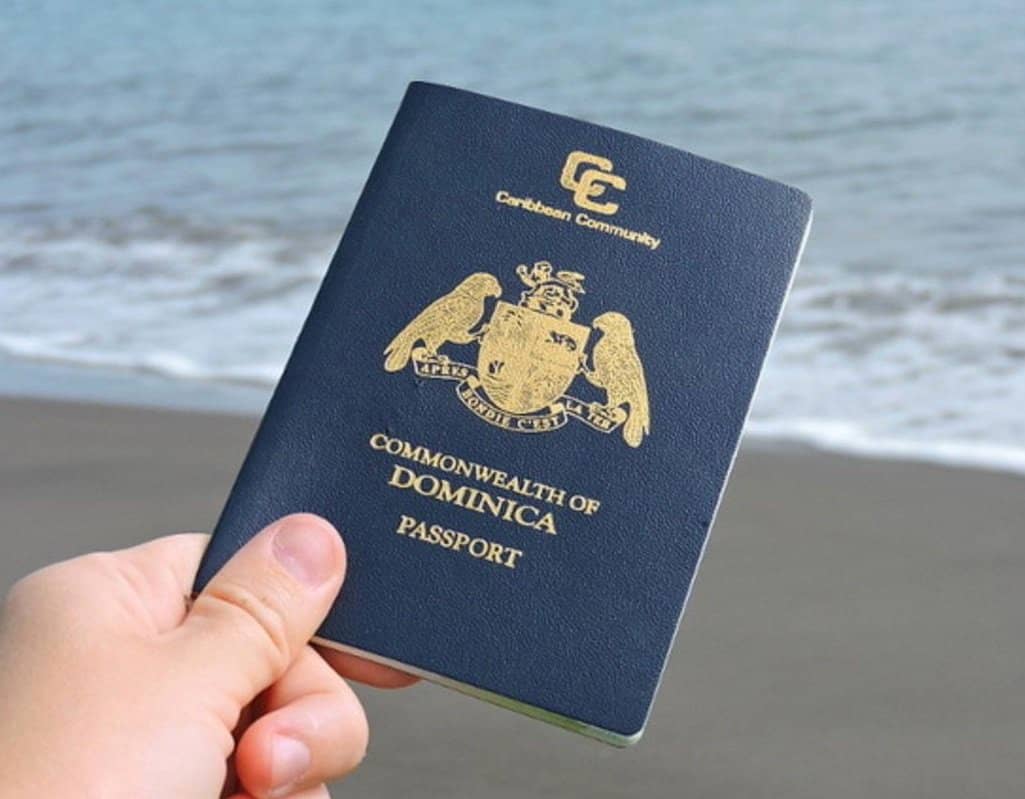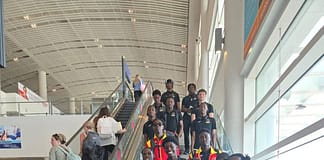
The findings from the investigation are detailed in a report called ‘Dominica: Passports of the Caribbean.’
According to the investigation, Dominica has the world’s biggest “golden passport” scheme, earning US$ 1 billion since 2009, but the names of the people who bought Dominican passports have been difficult to obtain.
“But, working with over a dozen media partners, OCCRP and the Government Accountability Project, a Washington D.C.-based nonprofit, have obtained the names of roughly 7,700 people who have purchased Dominica passports in recent years,” the OCCRP wrote in a report on the investigation.
“Among the largest groups of buyers were people from Russia, China, Iran, including people of considerable wealth.
Among them, for example, are two Russian billionaires of Azerbaijani origin who were later sanctioned after Russia’s full-scale invasion of Ukraine.”
What makes the investigation rather disturbing is the fact that many people who obtained Dominican citizenship and passport have pasts which has been described as “dark.”

Among them was Afghan spymaster, Asadullah Khalid, who according to the report, has been publicly accused of systematic human rights violations.
“In 2009, a Canadian diplomat who worked with him testified at a parliamentary commission that, during his time as a provincial governor, Khalid allegedly operated a dungeon in which he was “known to personally torture people,” the report stated.
“Khalid dismissed the allegations as “propaganda” — only to be featured in multiple subsequent reports by journalists and human rights groups that alleged his involvement in “arbitrary detention, rape, and torture.”
Others who bought passports, according to the report, were Saddam Hussein’s top nuclear scientist— known as the father of Iraq’s nuclear program, and a Libyan colonel who served under Muammar Ghaddafi did so the following year.
Many of these people got Dominican passports despite the government in Dominica saying that the process for obtaining them had a “multi-layered” checks and balances system in place that was “handled by top-rated due diligence agencies.”
The report gave the example of Rakesh Wadhwa, who despite having legal issues in Nepal, was granted a Dominican passport.
He got his passport in 2016, which he said was handled through a Dubai-based company called Citizenship Invest and the entire process took only a few weeks.
“They appointed an American firm to carry out the due diligence on my background and [my] cases in Nepal,” he was quoted as saying.
“When I asked [Citizenship Invest] if my legal troubles would be a hindrance … they said not to worry about it, and that the [American] compliance company will not look at the ongoing cases no matter how complicated they may be.”
Based on the report, others who received Dominican citizenship include Jordanian businessman Mutasem Faouri and his father Fayez, who received their passports in 2010. Two years later they were arrested, charged with defrauding investors of tens of millions of dollars, and sentenced to prison terms.
“They are currently appealing these convictions,” the report said.
“But while the elder Faouri is currently serving a sentence on a related case, Mutasem, who also received a sentence, managed to evade prison.
He has since set up companies in the United Kingdom, listing his nationality as “Dominica” and his country of residence as the United Arab Emirates.
Neither Fayez nor Mutasem responded to requests for comment.”
Another was Spanish citizen, Pedro Fort Berbel, “who bought Dominican citizenship in 2015 —was accused two years later by the U.S. Securities and Exchange Commission (SEC) of running a Ponzi and multi-level marketing scheme at that time worth tens of millions of dollars.”
The report said attempts to get a comment from the government of Dominica or Prime Minister Roosevelt Skerrit were futile but he did address the matter at a recent press conference here.
“There continues to be an attempt by some in this country to destroy the [citizenship-by-investment program] and so they are colluding with international journalists and some regional journalists to propagate a lot of mischief, misinformation about our program, all in an effort to destroy it,” he said.
“And some people are part of this in Dominica just because they want to get the Labour Party out of government.”
He added, “We have professed to have a robust system that we go through in different layers of due diligence.
If somebody were to become a citizen of Dominica today and tomorrow morning the person goes and does something and finds himself in a problem with the law, you can’t blame the program for that.”
Despite this assurance, Dominica’s CBI program has drawn the attention of the UK, which had previously granted citizens of the island free access. A visa restriction was subsequently imposed on travelers from Dominica due to what the UK government said was “clear and evident abuse” of the program.
British Home Secretary Suella Braverman stated that the island had been granting citizenship to “individuals known to pose a risk to the UK.”
The report stated that Dominica’s CBI program has been a success under Skerrit, raising $775 million between 2009 and 2021 for the island, “helping to fund government programs and keep Skerrit’s party in power.”
“The growing sector has attracted more than 70 companies approved to facilitate the country’s private passport business. A number of them have also branched into real estate development on the island,” it said.
“One of the most prominent is Montreal Management Consultants Est (MMCE), registered in the UAE and run by a man named Anthony Haiden.
Aside from facilitating passport sales, Haiden’s MMCE also has a development arm in Dominica, MMC Development, which describes itself on its website as the country’s “leading development company.”
Among its major projects is the development of a new international airport reportedly valued at $370 million.”
Click on the links below to read more about the investigation.
Advertise with the mоѕt vіѕіtеd nеwѕ ѕіtе іn Antigua!
We offer fully customizable and flexible digital marketing packages.
Contact us at [email protected]
















A concerning case has emerged regarding the citizenship application of Ms. Amber Louise Murphy in the Commonwealth of Dominica. Leaked correspondence has revealed a web of deceit involving forged documents, false information, and an alleged criminal scheme aimed at defrauding the UK HMRC (Her Majesty’s Revenue and Customs).
Dominica passport — Dominica offers a citizenship by investment program
The startling information was brought to the attention of Dominica authorities through a letter detailing serious concerns about Ms. Murphy’s citizenship application. The letter outlines a series of discrepancies and irregularities in her application:
1. **Fraudulent Professional Reference Letter:** A “Professional Reference Letter” dated 26 October 2016, allegedly signed by an individual, was found to be fraudulent. The stamp affixed to the document did not belong to the stated organization, and the signatory denied any knowledge of Ms. Murphy in 2011, casting doubts on the authenticity of the reference.
2. **Invalid Declaration of Trust:** The “Declaration of Trust” dated 24 August 2012, submitted as part of her application, was revealed to be invalid, as it had been superseded by another Declaration of Trust, raising questions about the timing and legitimacy of the document.
3. **Misrepresentation of Company Ownership:** Contrary to her claims, Ms. Murphy was not the true Ultimate Beneficial Owner of the company in question. During her citizenship application, she held no significant control or authority over the company’s affairs, instead working as a freelancer with limited influence. A declaration from a former director supported this assertion.
4. **False Residency Claims:** Despite declaring her residency as Bushey, UK, and providing supporting documents and affidavits, evidence suggested that Ms. Murphy was a resident of the Dominican Republic at the time. This conflicting information raises questions about the accuracy of her declared residencies.
One of the most serious allegations is that Ms. Murphy, by falsely claiming UK residency, may have engaged in deliberate tax evasion, using her Dominica citizenship as part of a criminal scheme to defraud the UK HMRC.
Furthermore, Ms. Murphy is currently the subject of three arrest warrants, covering 30 criminal charges, which has led to her being classified as a fugitive from justice. These revelations cast significant doubt on her character and conduct.
In light of these alarming findings, Dominica authorities have been urged to conduct a thorough review of the evidence and take appropriate measures to protect the integrity of the Dominica citizenship by investment program. The aim is to uphold Dominica’s reputation as a jurisdiction that is steadfastly opposed to criminal activities and maintains the highest standards of scrutiny in its citizenship approval process.
This case highlights the critical importance of maintaining rigorous due diligence processes in citizenship-by-investment programs to prevent misuse and maintain the credibility of such programs.
The authorities in Dominica have not yet issued an official response to these allegations. However, this scandal is likely to prompt broader discussions about the vetting processes and oversight in similar citizenship programs worldwide.
Comments are closed.